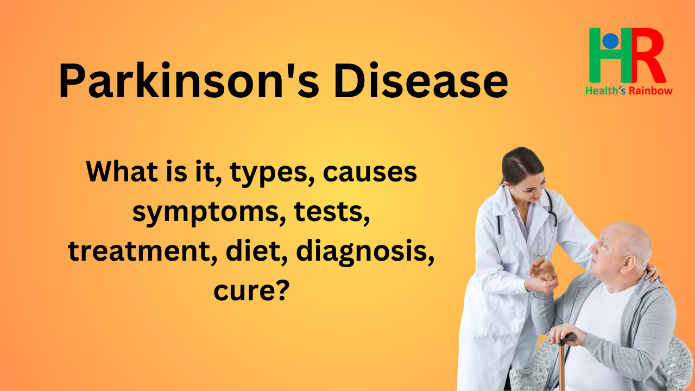
What is Parkinson’s Disease?
Parkinson’s Disease is a progressive neurodegenerative disorder that affects movement. It’s caused by the loss of dopamine-producing neurons in the brain.
Definition of Parkinson’s Disease?
Parkinson’s Disease is a chronic and progressive movement disorder. It is characterized by tremors, rigidity, slowness of movement (bradykinesia), and postural instability.
Types of Parkinson’s Disease?
While there aren’t strictly defined “types,” Parkinson’s can present with different dominant symptoms or progress at different rates in individuals. Sometimes it is classified as:
• Tremor-dominant: Where tremor is the most prominent symptom.
• Gait-instability dominant: Where balance and walking problems are more pronounced.
Symptoms of Parkinson’s Disease?
The most common symptoms are related to movement:
• Tremor: Shaking, usually starting in one hand or arm, even when at rest.
• Rigidity: Stiffness of the limbs or trunk.
• Bradykinesia: Slowness of movement.
• Postural instability: Problems with balance and coordination, often leading to falls.
Other symptoms can include?
• Gait problems: Shuffling walk, freezing, difficulty initiating movement.
• Speech changes: Soft voice, monotone, slurred speech.
• Writing changes: Small, cramped handwriting.
• Loss of smell (anosmia): Often an early symptom.
• Sleep disturbances: Insomnia, restless legs syndrome.
• Constipation.
• Mood disorders: Depression, anxiety.
• Cognitive impairment: Memory problems, dementia (in later stages).
Causes of Parkinson’s Disease?
The exact cause is unknown, but it’s likely a combination of factors:
• Genetics: Some genetic mutations increase risk, but most cases are not directly inherited.
• Environmental factors: Exposure to certain toxins (like pesticides) is being researched.
• Age: Risk increases with age.
• Lewy bodies: Abnormal protein deposits found in the brains of people with Parkinson’s.
Who Can Suffer from Parkinson’s Disease?
Parkinson’s primarily affects people over 60, but it can occur earlier (young-onset Parkinson’s).
Diagnostic Tests for Parkinson’s Disease?
Diagnosis is primarily based on:
• Medical history and neurological exam: Assessing motor skills, reflexes, and other neurological functions.
• Symptom review: Looking for the classic signs of Parkinson’s.
• Response to medication: Levodopa is a medication that helps with Parkinson’s symptoms. A positive response to levodopa supports the diagnosis.
• Brain scans (DaTscan): Can sometimes be helpful to confirm loss of dopamine-producing neurons, but it’s not always necessary for diagnosis. MRI is more used to rule out other conditions.
Stages of Parkinson’s Disease?
Parkinson’s progresses through stages, but the progression is different for everyone:
• Stage 1: Mild symptoms, often only on one side of the body.
• Stage 2: Symptoms become more noticeable, affecting both sides of the body.
• Stage 3: Moderate symptoms, some balance problems.
• Stage 4: Significant disability, needing help with daily activities.
• Stage 5: Severe symptoms, difficulty walking, and needing full-time care.
Treatment of Parkinson’s Disease?
There is no cure, but treatments can help manage symptoms:
• Medications: Levodopa is the most common medication, converting to dopamine in the brain. Other medications help with specific symptoms.
• Surgery: Deep brain stimulation (DBS) can be an option for some people.
• Therapies: Physical therapy, occupational therapy, and speech therapy can help maintain function and quality of life.
• Lifestyle changes: Exercise, healthy diet, and stress management are important.
Best Diet for Parkinson’s Disease?
A healthy diet can support overall health and well-being:
• High in fruits, vegetables, and whole grains.
• Adequate fiber: To help with constipation.
• Lean protein.
• Limiting saturated fats and processed foods.
Overall Survival Rate of Parkinson’s Disease?
Parkinson’s itself is not usually fatal, but it can lead to complications (like falls, pneumonia) that can be life-threatening. People with Parkinson’s can live for many years.
Which Doctor Treats Parkinson’s?
• Neurologist: A doctor specializing in brain and nervous system disorders.
Diseases Associated with Parkinson’s?
Parkinson’s is not directly associated with cancer, but some shared risk factors (like aging) exist. It is associated with other neurological conditions and can increase the risk of dementia.
How to Prevent Parkinson’s Disease?
There is no proven way to prevent Parkinson’s, but a healthy lifestyle, including a balanced diet and regular exercise, may help reduce risk. Further research is needed to determine preventative strategies.
References for Parkinson’s Disease?
• Parkinson’s Foundation: A leading resource for information and support.
• National Institute of Neurological Disorders and Stroke (NINDS): Provides research-based information.
• Michael J. Fox Foundation: Dedicated to finding a cure for Parkinson’s.
For more information Visit us :
Website: http://www.healthsrainbow.com/
Website Blog: https://www.healthsrainbow.com/blog/
Subscriber: https://www.youtube.com/@healthsrainbow4897
Facebook Page: https://www.facebook.com/profile.php?id=100087738795787
Facebook Main Page: https://www.facebook.com/profile.php?id=100072657459686
Instagram: https://www.instagram.com/healthsrainbow/
Twitter: https://twitter.com/healths_rainbow
RELATED VIDEO :
- Urine culture and sensitivity test : https://youtu.be/bGT0uoWumus
- Microalbumin Urine test : https://youtu.be/T0wDz7rKFwc
- Chyle test : https://youtu.be/px-J1QeN6Ds
RELATED ARTICLE :
- Urine Test : https://www.healthsrainbow.com/blog/2022/04/20/
- FNAC TEST : https://www.healthsrainbow.com/blog/2022/02/02/
- TLC TEST : https://www.healthsrainbow.com/blog/2022/01/21/
VISIT OUR WEBSITE
This video Covers the information about:
What is Parkinson’s Disease? Definition of Parkinson’s Disease? Types of Parkinson’s Disease? Symptoms of Parkinson’s Disease? Other symptoms can include? Causes of Parkinson’s Disease? Who Can Suffer from Parkinson’s Disease? Diagnostic Tests for Parkinson’s Disease? Stages of Parkinson’s Disease? Treatment of Parkinson’s Disease? Best Diet for Parkinson’s Disease? Overall Survival Rate of Parkinson’s Disease? Which Doctor Treats Parkinson’s? References for Parkinson’s Disease?
PUBLISHED BY HEALTHS RAINBOW
